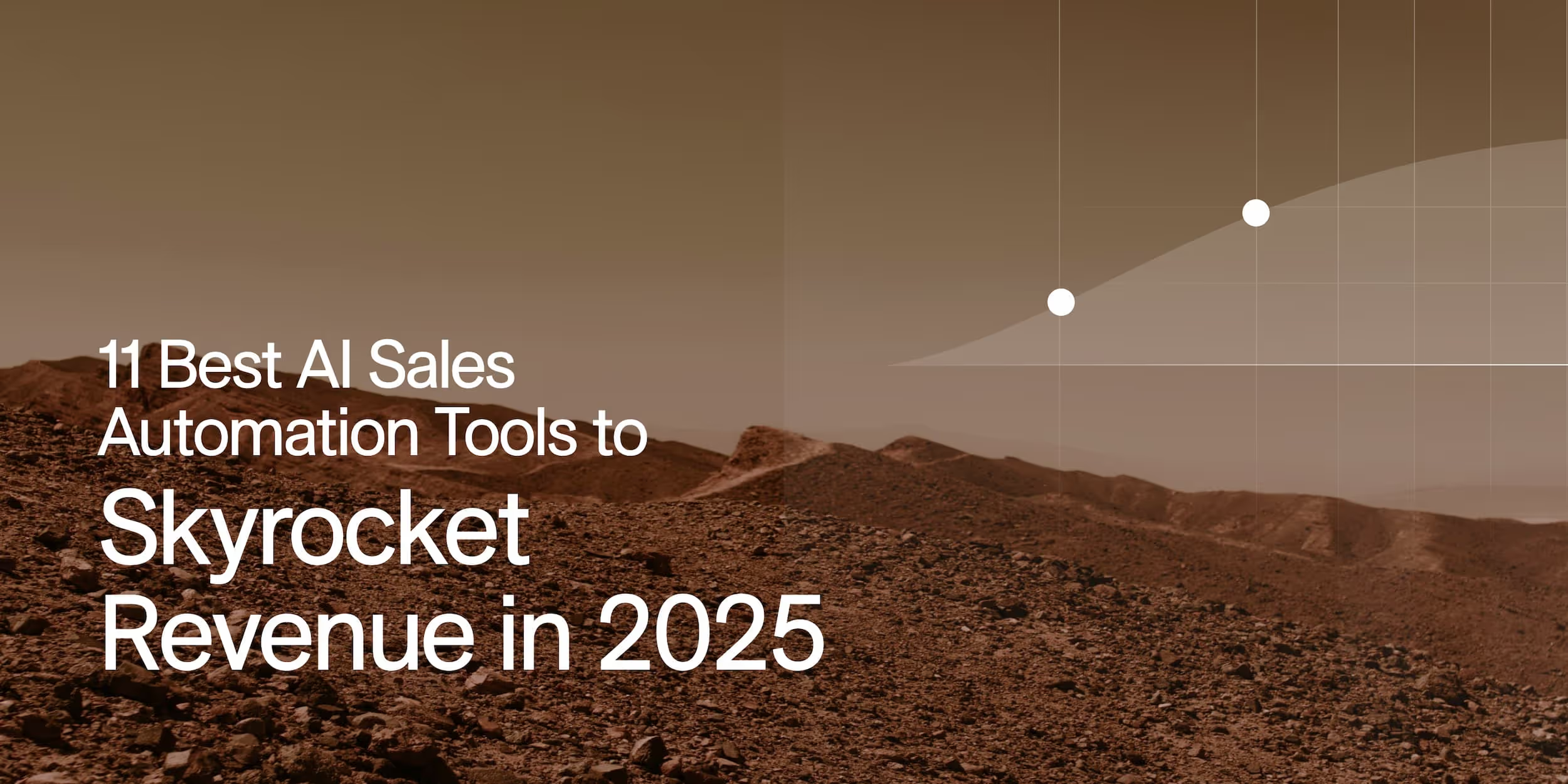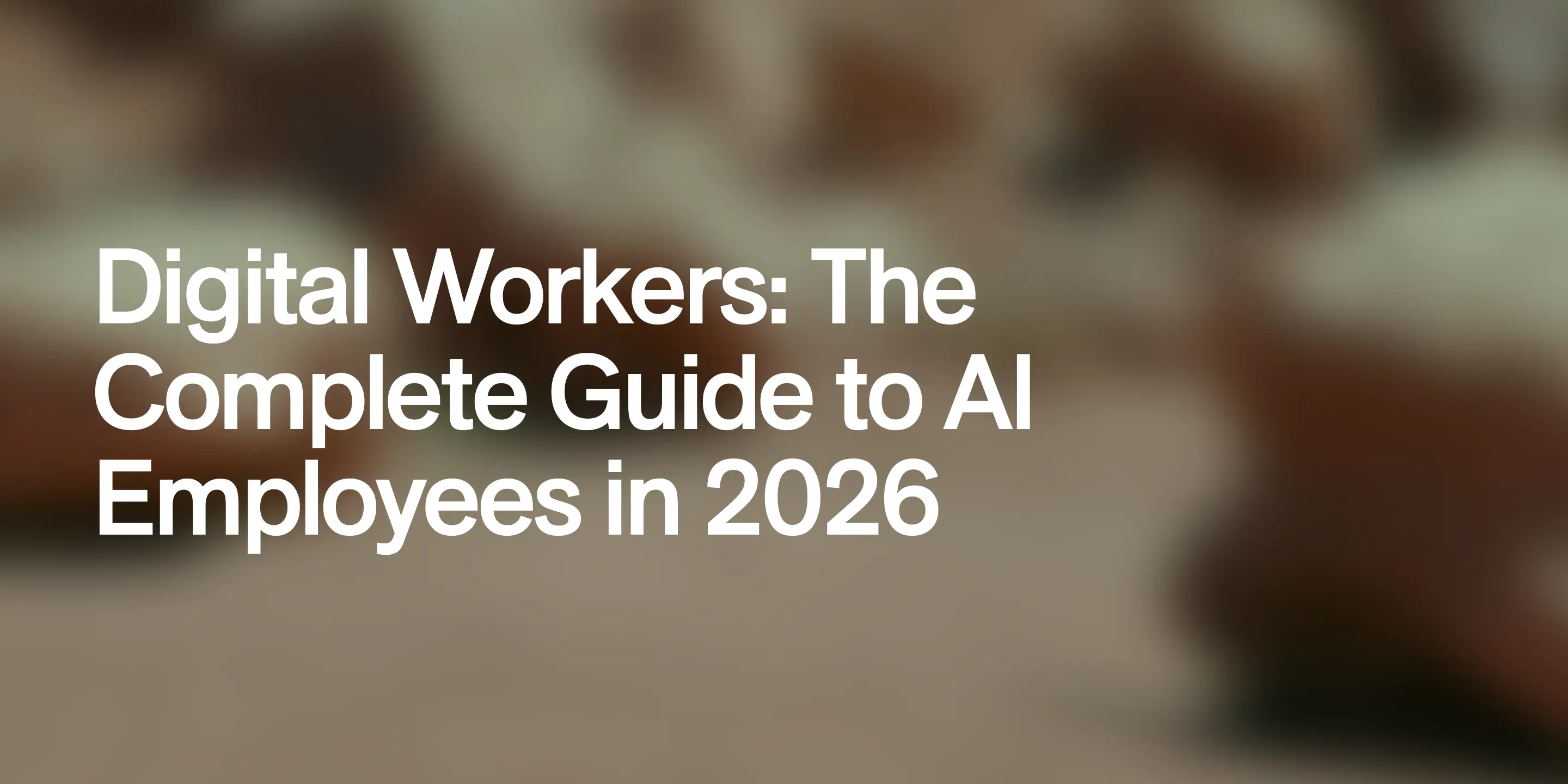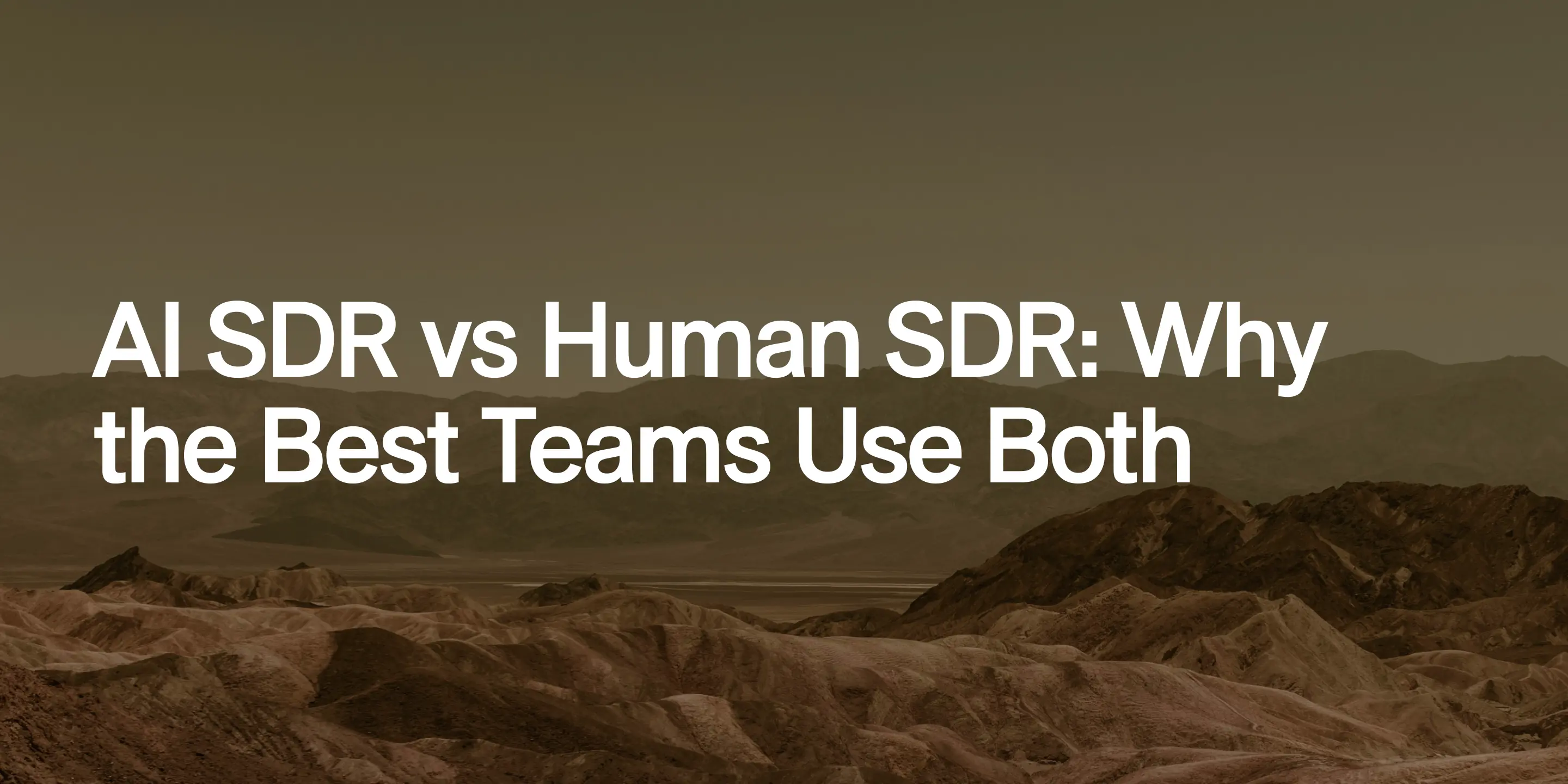AI sales automation tools are no longer futuristic concepts—they're your next essential teammates driving measurable revenue growth. This comprehensive guide delivers criteria-driven comparisons for small business, mid-market, and enterprise teams seeking to automate prospecting, engagement, and pipeline management.
The market momentum is undeniable: AI for sales and marketing is projected to grow from $57.99B in 2025 to $240.58B by 2030 (32.9% CAGR). Additionally, 71% of B2B sales leaders increased AI investment in 2024, proving this isn't hype - it's strategic necessity.
Our methodology prioritizes neutral, criteria-driven analysis: 90% objective feature comparisons, 10% strategic insights from industry experience. You'll discover which platforms excel at autonomous prospecting, multichannel engagement, pipeline automation, and enterprise governance.
Schedule a product demo with our expert team
The Best AI Sales Automation Tools
Our analysis covers 11 leading platforms across prospecting, engagement, pipeline management, data enrichment, and AI autonomy. Each evaluation considers enterprise readiness, integration depth, and measurable ROI potential.
Selection criteria include coverage across the complete sales lifecycle, AI sophistication, multichannel capabilities, CRM integration quality, governance features, and proven customer outcomes.
1. 11x Digital Workers (Alice and Julian) — best for autonomous SDRs and phone reps with multichannel outreach
11x delivers autonomous digital workers that operate as true virtual team members, fully owning sales outcomes. Alice (AI SDR) is focused on outbound success; conducting deep research, crafting personalized outreach, and securing meetings with qualified prospects. Julian (AI phone rep) is designed for inbound excellence - calling new leads immediately, qualifying them in real time, and helping companies convert more inbound opportunities into revenue.
Core Capabilities:
- True autonomy: Goal-driven agents that execute complete workflows from outreach to booked meetings
- Multichannel orchestration: Seamless coordination across email and phone in with unified conversation tracking
- Signal-driven intelligence: Functions as a customizable AI researcher that tracks standard signals such as job changes, funding events, and hiring patterns, while also allowing teams to define niche triggers unique to their business for precision outreach
- Deep CRM integration: Bi-directional sync with comprehensive activity logging and status updates
Standout Features:
- Customizable research and personalization for insightful outreach
- Speed-to-lead for improved lead conversion and nurturing by calling prospects within 1-minute of them registering interest in your product
- Compliance-aware workflows with configurable guardrails and approval processes
Competitive Advantages:
- First platform to deliver truly autonomous digital workers rather than task-based automation
- Superior multichannel orchestration
- Advanced self-learning capabilities that continuously optimize performance
- Enterprise-ready governance and compliance features from day one
Ideal Fit: Teams that need to consistently book more meetings without adding headcount. Designed for organizations that want autonomous execution, personalized outreach, and overall improvements conversion across all stages of their funnel.
ROI Impact: Gupshup saw a 50 % increase in SQLs per SDR after adopting Alice, enabling a 1.5× boost in output per rep—and freeing up time for strategic initiatives like calling and rapid campaign testing, all without increasing headcount.
Schedule a product demo with our expert team
2. Apollo.io — best for data-rich prospecting and sales engagement
Apollo.io combines a comprehensive B2B database with integrated engagement sequences, making it a popular choice for teams prioritizing data quality and prospecting efficiency.
Strengths:
- 200M+ contact database with advanced filtering and search capabilities
- AI-powered email validation and deliverability optimization
- Proven ROI and time savings for knowledge workers
- Integrated CRM functionality with pipeline management
Limitations:
- Less autonomous than agentic AI systems requiring more manual sequence management
- Advanced forecasting and governance features may require additional tools
- Limited phone and social channel automation compared to multichannel platforms
Ideal Fit: SMBs and mid-market teams needing rapid list building and outreach capabilities with strong data foundation.
3. Outreach — best for enterprise sales engagement and cadence management
Outreach provides mature cadence management with enterprise-grade analytics and workflow orchestration capabilities.
Strengths:
- Sophisticated cadence management with A/B testing and optimization
- Enterprise security controls and compliance features
- Extensive integration ecosystem and API capabilities
Limitations:
- Requires external data sources for comprehensive enrichment
- Not extensive Research and Personalization
- Less autonomous than agentic AI systems
- Complex setup and configuration for optimal performance
Ideal Fit: Enterprise sales teams requiring standardized processes, non-extensive customization, and rigorous governance controls.
4. Salesloft — best for multichannel engagement and team workflows
Salesloft offers strong multichannel cadence management with integrated coaching features and team performance visibility.
Strengths:
- Comprehensive analytics and performance tracking
- Template management and content optimization tools
- Integrated calling features with local presence
- Team collaboration and coaching capabilities
Limitations:
- Depends on external data providers for enrichment
- Not a fully autonomous agent requiring manual sequence management
- Advanced AI features may require additional licensing
Ideal Fit: Mid-market to enterprise teams standardizing multichannel outreach with emphasis on team performance and coaching.
5. HubSpot Sales Hub — best all-in-one CRM for growing teams
HubSpot Sales Hub provides CRM-native engagement automation with unified marketing and sales alignment for growing organizations.
Strengths:
- Intuitive interface with rapid time-to-value
- Unified data model across marketing and sales
- Built-in automation workflows and sequences
- Strong ecosystem of integrations and apps
Limitations:
- AI autonomy and advanced forecasting capabilities may be lighter than specialist platforms
- Limited customization compared to enterprise-focused solutions
- Built for inbound leads lacking the research and personalization required for outbound activities
Ideal Fit: SMBs scaling into structured sales processes with strong marketing alignment requirements.
6. Salesforce Einstein — best for CRM-embedded AI and forecasting at scale
Salesforce Einstein embeds AI capabilities directly into the Salesforce platform for scoring, insights, and forecasting at enterprise scale.
Strengths:
- Deep CRM integration with native AI capabilities
- Extensibility across Salesforce clouds and custom objects
- Enterprise-grade security and governance controls
- Advanced analytics and reporting capabilities
Limitations:
- Configuration complexity requiring Salesforce expertise
- Higher total cost of ownership
- Limited engagement automation compared to specialist platforms
- Designed for inbound leads lacking the research and personalization required for outbound activities
Ideal Fit: Enterprises standardized on Salesforce requiring comprehensive AI capabilities with rigorous governance and compliance needs.
7. Gong — best for conversation intelligence and deal coaching
Gong specializes in conversation intelligence, transcribing and analyzing calls to deliver coaching insights and deal risk identification.
Strengths:
- Advanced conversation analysis and topic tracking
- Deal risk identification and pipeline insights
- Coaching recommendations and performance benchmarking
- Integration with major CRM and engagement platforms
Limitations:
- Not a complete engagement or data platform
- Requires integration with other tools for full sales automation
- Limited prospecting and outreach capabilities
Ideal Fit: Teams focused on improving rep effectiveness, win rates, and deal coaching with existing engagement infrastructure.
8. Clari — best for revenue intelligence and forecasting accuracy
Clari focuses on revenue intelligence, providing predictive forecasting and pipeline risk analysis for revenue leadership.
Strengths:
- Advanced predictive analytics for forecast accuracy
- Deal and pipeline risk identification
- Executive-level revenue reviews and insights
- Integration with major CRM platforms
Limitations:
- Not designed for outbound engagement or prospecting
- Requires integration with engagement platforms
- Higher cost structure focused on enterprise buyers
Ideal Fit: Revenue leadership prioritizing forecast accuracy, pipeline health, and strategic revenue planning.
9. Regie.ai — best for AI-generated messaging
Regie.ai specializes in AI-powered content generation for sales sequences and messaging at scale.
Strengths:
- Rapid content creation
- Brand voice consistency across messaging
- Integration with major engagement platforms
- A/B testing and optimization capabilities
Limitations:
- Requires governance controls for brand compliance
- Limited research capabilities and personalization
- Limited autonomous execution capabilities
Ideal Fit: Teams needing high-volume, on-brand messaging with existing engagement platform infrastructure.
10. Cognism — best for compliant data enrichment and intent-led prospecting
Cognism provides B2B data and intent signals with a compliance-first approach, particularly strong in EMEA markets.
Strengths:
- High data accuracy with compliance focus
- Intent data integration for timing optimization
- GDPR-compliant data practices
- Integration with major engagement platforms
Limitations:
- Limited engagement capabilities requiring additional tools
- Higher cost per contact compared to some alternatives
- Primarily focused on data rather than execution
Ideal Fit: Compliance-minded organizations, particularly in EMEA, requiring high-quality data with strong privacy controls.
11. 6sense — best for account intent and predictive targeting
6sense specializes in account identification and intent data to prioritize outreach for account-based marketing and sales approaches.
Strengths:
- Advanced intent data and account identification
- Predictive modeling for buying stage identification
- ABM campaign orchestration capabilities
- Integration with major marketing and sales platforms
Limitations:
- Requires orchestration with engagement platforms
- Complex setup and data mapping requirements
- Higher cost structure focused on enterprise ABM
Ideal Fit: ABM-focused teams targeting complex buying committees with sophisticated account intelligence requirements.
Schedule a product demo with our expert team
What Is AI Sales Automation
AI sales automation uses machine learning, natural language processing, and predictive analytics to autonomously execute sales activities. Unlike traditional rule-based workflows that follow rigid if/then logic, AI systems learn from outcomes and continuously optimize their approach.
Key Terms:
- Machine learning: Algorithms that learn patterns from data to make predictions without explicit programming for each scenario
- Natural language processing (NLP): AI techniques that understand and generate human language for conversations and messaging
- Predictive analytics: Statistical methods that estimate future outcomes like conversion probability and forecast accuracy
How AI elevates traditional workflow automation
AI sales automation represents a fundamental shift from static automation to intelligent, adaptive systems. Traditional workflow automation executes predetermined sequences based on triggers. AI automation analyzes patterns across thousands of interactions to optimize timing, messaging, and channel selection in real-time.
The impact is measurable: companies report automated lead generation cuts manual prospecting time by up to 70%. Organizations implementing AI-powered sales processes see 10-20% ROI improvements compared to manual approaches.
This evolution enables sales teams to focus on high-value activities like relationship building and deal strategy while AI handles repetitive prospecting and nurturing tasks.
Core use cases across prospecting, engagement, and pipeline automation
AI sales automation delivers value across four critical areas:
Prospecting:
- Data enrichment and contact discovery
- Intent signal detection and lead scoring
- Ideal customer profile refinement
- Territory and account prioritization
Engagement:
- Multichannel outreach across email, phone, and social
- Dynamic personalization based on prospect behavior
- Automated objection handling and follow-up sequences
- Optimal timing and frequency optimization
Pipeline automation:
- Next-best action recommendations
- Deal risk identification and alerts
- Renewal and expansion opportunity triggers
- Automated pipeline hygiene and data updates
Coaching and insights:
- Conversation intelligence and sentiment analysis
- Real-time coaching suggestions during calls
- Win/loss analysis and pattern identification
- Performance benchmarking and skill gap analysis
The results validate the investment: 75% of companies report forecasting accuracy increases with AI, while automation saves knowledge workers approximately 5 hours per week on average.
Autonomous digital workers vs. task-based automations
Understanding the distinction between autonomous digital workers and task-based automation is crucial for platform selection.
Digital workers (agentic AI) operate as goal-driven agents that sequence tasks, reason over multiple signals, and adapt strategies across channels with minimal supervision. They function like virtual team members who understand objectives and determine the best path to achieve them.
Task-based automation executes narrow, rule-based steps within specific applications. These systems don't adapt or reason across contexts—they simply follow predetermined workflows.
Key Differences:
Digital workers like those offered by leading platforms automate entire SDR or phone rep roles while maintaining integration with CRM systems and compliance workflows. This agentic approach represents the next evolution in sales automation.
Schedule a product demo with our expert team
How to Choose the Right AI Sales Automation Platform
Selecting the right platform requires a systematic approach focused on fit, feasibility, and future-proofing. Start with an outcome-first methodology: identify 3-5 prioritized use cases with measurable targets like reply rates, meeting bookings, forecast accuracy, or cycle time reduction.
Evaluation criteria for enterprise buyers (security, governance, scalability)
Enterprise buyers must prioritize platforms that meet rigorous operational and compliance requirements:
Security & Compliance:
- Data residency controls and encryption standards
- SSO/SAML integration and multi-factor authentication
- SOC 2 compliance and audit trail capabilities
- DPA/BAA readiness for regulated industries
- Role-based access controls with least-privilege principles
Governance & Risk Management:
- Human-in-the-loop approval workflows for sensitive outreach
- Policy enforcement for content, timing, and audience restrictions
- PII handling and data retention controls
- Content review and brand compliance features
- Explainable AI for transparent decision-making
Scalability & Performance:
- Concurrency limits and rate-limit management
- Multi-tenant organization structure support
- API throughput and integration capacity
- Global deployment and localization capabilities
- Performance monitoring and SLA guarantees
Integration Depth:
- Bi-directional CRM synchronization
- Custom object and field mapping
- Activity logging and attribution tracking
- Third-party enrichment connectors
- Workflow orchestration capabilities
Deliverability & Communication:
- Domain and IP warming protocols
- Inbox rotation and reputation management
- Carrier compliance (STIR/SHAKEN for calls)
- Call recording and consent management
- Spam filter optimization
Companies implementing comprehensive AI sales automation report 10-20% ROI increases and 20% reduction in human errors, validating the investment in robust platforms.
What's the best sales automation tool for small business
Small businesses need platforms that maximize value while minimizing complexity and cost:
Essential Criteria:
- All-in-one value: Integrated CRM, engagement, and data enrichment
- Affordability: Freemium tiers or low-cost entry points with clear upgrade paths
- Ease of setup: Pre-built templates, native data sources, and minimal configuration
- Fast time-to-value: Quick wins within 30 days of implementation
Recommended Approaches:
11x Digital Workers excel for autonomous SDR and phone rep capabilities with multichannel orchestration. The platform delivers measurable ROI through intelligent, self-learning agents that handle complete job functions while maintaining enterprise-grade security and compliance.
Apollo.io provides solid data-rich prospecting with 200M+ contacts and integrated sequences. The platform delivers measurable ROI and time savings for growing teams needing comprehensive prospecting capabilities.
HubSpot Sales Hub offers CRM-native engagement with automation sequences and deal tracking. The unified data model and rapid deployment make it suitable for SMBs scaling structured sales processes.
Trade-offs: Traditional platforms offer less autonomous capabilities compared to agentic systems but provide solid foundations for basic automation needs.
Recommended Starter Stack:
- Autonomous digital worker capabilities for complete job function automation
- Data enrichment and contact discovery
- Email sequence automation with advanced personalization
- Multichannel coordination across email, phone, and social
- Basic reporting and performance analytics
This approach allows small businesses to build sophisticated automation capabilities from day one and scale efficiently as they grow.
Automated sales pipeline software checklist
Evaluate pipeline automation capabilities using this comprehensive checklist:
Pipeline Visibility:
- Real-time stage health monitoring and risk identification
- Next-best action recommendations based on deal characteristics
- Automated pipeline hygiene and data quality enforcement
- Custom milestone tracking and progress indicators
Forecasting Accuracy:
- Explainable predictions with confidence intervals
- Historical performance analysis and trend identification
- Scenario modeling for different close rate assumptions
- Integration with quota and territory planning systems
Activity Capture:
- Bi-directional CRM synchronization with conflict resolution
- Automatic deduplication and data standardization
- Custom field mapping and object relationship management
- Email and call activity attribution
Deal Execution:
- Automated playbook recommendations by deal stage
- Renewal intent detection and expansion opportunity identification
- Competitive intelligence integration and alerts
- Contract and proposal automation workflows
Coaching & Analytics:
- Conversation intelligence and sentiment analysis
- Win/loss pattern identification and coaching insights
- Performance benchmarking against team and industry standards
- Skill gap analysis and training recommendations
Security & Compliance:
- Comprehensive audit trails for all system actions
- Granular permission controls and approval workflows
- PII/PHI handling for regulated industries
- Data retention and deletion policies
Deliverability Management: Deliverability refers to the likelihood that emails reach the inbox versus spam folders. Success depends on domain reputation, content quality, and sending behavior patterns. Look for platforms that provide domain warming, reputation monitoring, and deliverability analytics.
Schedule a product demo with our expert team
Implementation, Security, and ROI
Successful AI sales automation deployment requires phased implementation that protects deliverability and data quality while demonstrating measurable ROI from day one.
30–60–90 day rollout plan that protects deliverability and data quality
Step 1 (Days 1–30): Foundation and Pilot
- Define 2-3 specific use cases (e.g., closed-lost revival, net-new prospecting)
- Establish CRM integration with validated field mappings and deduplication rules
- Begin domain warming and IP reputation building at low volume to protect sender reputation
- Launch pilot with small cohort (10-20 prospects) to A/B test messaging and channels
- Implement basic reporting dashboards for opens, replies, and meeting bookings
Step 2 (Days 31–60): Multichannel Expansion
- Expand to multichannel orchestration (email + phone + social media)
- Enable signal-based triggers for job changes, funding events, and intent data
- Implement human-in-the-loop approvals for sensitive or high-value outreach
- Add quality assurance checklists and content review processes
- Scale pilot to broader segments while monitoring deliverability metrics
Step 3 (Days 61–90): Full Deployment and Optimization
- Deploy to all target segments with codified playbooks and messaging frameworks
- Automate feedback loops for continuous optimization of scoring and content
- Implement weekly deliverability reviews with inbox rotation and send limit management
- Establish performance benchmarks and ROI tracking across all use cases
- Document best practices and create training materials for team expansion
Domain Warming Definition: Domain warming involves gradually increasing email send volume from new domains to build positive sender reputation and avoid spam filters. This process typically takes 2-4 weeks and requires careful volume management.
Security and compliance essentials for enterprise adoption
Enterprise AI sales automation requires comprehensive security and compliance controls:
Identity & Access Management:
- SSO/SAML integration with multi-factor authentication
- SCIM provisioning for automated user lifecycle management
- Least-privilege role-based access controls
- Regular access reviews and deprovisioning workflows
Data Protection:
- Encryption at rest and in transit using industry-standard protocols
- Data residency controls for global compliance requirements
- Secret management and API key rotation policies
- Data loss prevention (DLP) integration and monitoring
Audit & Governance:
- Comprehensive activity logging with tamper-evident audit trails
- Approval workflows for sensitive outreach and content changes
- Policy-based content controls and brand compliance enforcement
- Explainable AI for transparent decision-making and regulatory review
Privacy & Consent Management:
- GDPR/CCPA compliance with automated consent tracking
- Opt-out management and suppression list maintenance
- Lawful basis documentation for PII processing
- Data retention and deletion policy automation
Communication Compliance:
- STIR/SHAKEN attestation for outbound calling
- TCPA-compliant cadence management with consent verification
- Configurable call recording policies by jurisdiction
- Spam filter optimization and deliverability monitoring
Explainable AI Definition: Explainable AI provides transparent insight into how models arrive at recommendations, supporting trust-building and regulatory compliance by showing the factors and logic behind AI decisions.
ROI model and payback periods by use case
Calculating ROI requires a systematic approach that accounts for both direct revenue impact and operational efficiency gains.
ROI Formula: (Incremental Pipeline × Win Rate × Gross Margin - Program Cost) ÷ Program Cost
Example Calculation:
- Incremental Pipeline: $500,000 quarterly
- Win Rate: 25%
- Gross Margin: 80%
- Program Cost: $50,000 quarterly
- ROI: ($500,000 × 0.25 × 0.80 - $50,000) ÷ $50,000 = 100%
Payback Expectations: Typical payback periods range from 1-3 quarters depending on starting volume, data quality, and channel mix complexity.
Benchmark Performance Metrics:
- Companies report 10-20% ROI increases with AI automation implementation
- 20% reduction in human errors through automated processes
- 5 hours per week saved per knowledge worker
- 75% of organizations see forecasting accuracy improvements
- Up to 70% reduction in manual prospecting time
Key Performance Indicators:
- Engagement metrics: Reply rate, meeting booking rate, response time
- Efficiency metrics: Cost per meeting, pipeline velocity, conversion rates by segment
- Quality metrics: Lead score accuracy, forecast variance, deal progression rates
- Operational metrics: Tool consolidation savings, onboarding time reduction, compliance adherence
Measuring Success: Track both hard outcomes (pipeline generation, revenue attribution) and soft savings (tool consolidation, reduced onboarding time). Establish baseline metrics before implementation and measure improvements quarterly.
Schedule a product demo with our expert team
AI sales automation represents a strategic inflection point for revenue teams in 2025. The market data is clear: organizations implementing AI-powered sales processes achieve measurable ROI improvements, significant time savings, and enhanced forecast accuracy.
Choose platforms based on your specific needs: autonomous digital workers for end-to-end automation, specialized tools for conversation intelligence or revenue forecasting, or integrated CRM solutions for growing teams. Success requires thoughtful implementation with proper governance, security controls, and performance measurement.
The companies that act decisively on AI sales automation will create sustainable competitive advantages through improved efficiency, better customer experiences, and accelerated revenue growth. Start with clear use cases, measure results rigorously, and scale successful implementations across your organization.
Schedule a product demo with our expert team
Frequently Asked Questions
Which platform is the best sales automation platform for enterprise?
11x digital workers deliver autonomous AI SDRs and phone reps that execute entire job functions across email, phone, and social channels with enterprise-grade security and governance. Unlike traditional platforms that require manual sequence management, 11x agents learn from every interaction, adapt messaging in real time, and integrate deeply with CRM systems. For enterprises needing autonomous execution with compliance controls, 11x provides goal-driven agents that operate 24/7 while maintaining audit trails and policy enforcement.
How do I calculate ROI and payback for AI sales automation?
Use this formula: (Incremental Pipeline × Win Rate × Gross Margin - Program Cost) ÷ Program Cost. Target 1-3 quarter payback periods depending on volume and data quality. Companies typically see 10-20% ROI increases and save 5 hours per week per knowledge worker through automation. Track hard outcomes like pipeline generation, meeting rates, and conversion improvements alongside soft savings from tool consolidation and reduced manual prospecting time.
How deep should Salesforce and HubSpot integrations go for governance and data quality?
Require bi-directional synchronization, custom object support, comprehensive activity logging, and permission-aware field updates to maintain auditability and clean reporting. 11x digital workers integrate seamlessly with both platforms, automatically logging all interactions, updating lead statuses, and syncing conversation data. Essential features include real-time data sync, custom field mapping, workflow triggers, and role-based permissions that align with your existing governance policies.
How does AI handle phone outreach and call compliance at scale?
11x Julian, our AI phone rep, operates with STIR/SHAKEN attestation, configurable call recording, and consent workflows built-in. The system applies policy-based guardrails per segment and region, automatically managing TCPA compliance and maintaining proper documentation. Julian adapts conversation flow based on prospect responses while ensuring all interactions meet regulatory requirements and company policies for different territories and industries.
How do AI agents maintain email deliverability across large volumes?
11x Alice automatically manages domain warming, inbox rotation, and daily send limits to protect sender reputation. The system monitors bounce rates, spam complaints, and reply rates in real time, adapting messaging quality and timing based on engagement signals. Alice implements proper authentication protocols and maintains deliverability through intelligent content optimization and engagement-driven sending patterns that build positive domain reputation over time.
Who are the leading AI-powered sales automation companies today?
11x leads the autonomous digital worker category with Alice (AI SDR) and Julian (AI phone rep) that handle entire job functions across multiple channels. Other providers focus on specific areas like CRM-native AI, engagement sequences, conversation analytics, or revenue forecasting. 11x differentiates through goal-driven agents that learn continuously, adapt strategies in real time, and deliver autonomous execution with enterprise-grade governance and compliance controls.




